|
|
|
Sort Order |
|
|
|
Items / Page
|
|
|
|
|
|
|
| Srl | Item |
| 1 |
ID:
160401
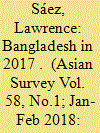

|
|
|
|
|
| Summary/Abstract |
Bangladesh experienced a turbulent year in 2017, largely as a result of damaging floods. Moreover, the flood of Rohingya refugees in the second half of the year added considerable strain to Bangladesh’s political economy. There are worrisome signs that the Bangladeshi state is using a range of institutional and extrajudicial mechanisms to stifle political opposition.
|
|
|
|
|
|
|
|
|
|
|
|
|
|
|
|
| 2 |
ID:
129645
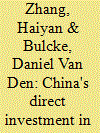

|
|
|
|
|
| Publication |
2014.
|
| Summary/Abstract |
While China is fast becoming an important outward direct investor, its companies are showing an increasing interest to locate in Europe and the European Union (EU). It has been suggested that this can partly be explained by the more lenient attitude of the European countries compared to the US, where some acquisitions were abandoned when they ran into political opposition based on security concerns. Yet, also in Europe, the media follow rather closely each new Chinese entry, and certain politicians have started to criticise the take-over of technology-oriented companies, especially by Chinese state-owned firms. Against the background of a very open foreign direct investment (FDI) policy as measured by OECD FDI Restrictiveness Index for the EU and the individual countries, an overview is given of the pre- and post-establishment obstacles to direct foreign investment. Also, the EU policy measures that directly or indirectly deal with incoming direct investment are discussed. Within the context of the EU competition policy and the merger regulation, the EU Commission has cleared five cases of take-over by Chinese state-owned enterprises. Although the Lisbon Treaty authorises the EU Commission to take charge of investment policy as part of the EU commercial policy, it will take time to realise this. If the announced negotiations about an investment treaty between China and the EU could work out the necessary balance, it would be an important step in achieving more reciprocity between their respective investment regimes.
|
|
|
|
|
|
|
|
|
|
|
|
|
|
|
|
| 3 |
ID:
129646
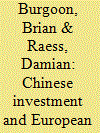

|
|
|
|
|
| Publication |
2014.
|
| Summary/Abstract |
The rapid increase in Chinese foreign direct investment (FDI) into Europe raises important questions about the implications of such for workers and organized labor in Europe: (1) does Chinese FDI flow more or less to regulated labor markets than do other investment sources?; (2) what are the strategies of works councilors and union representatives in dealing with real or expected investment from China?; and (3) how do individual workers view the propriety of Chinese FDI given China's low-wage, labor-unfriendly profile in the global economy? Quantitative and qualitative data on Chinese FDI, individual opinions about China and globalization, and on strategies of labor representatives provide some leverage to preliminarily answer these questions. First, Chinese FDI does not seem to be more (or less) focused on investing in the least regulated labor markets than other sources of FDI. Second, interviews with works councilors and union representatives in Germany, France and the Netherlands affirm a cautiously optimistic view of Chinese investors as no more or less threatening to organized labor than other investors. Third, analysis of attitudes about Chinese and European interests in managing globalization suggest that less-skilled, more vulnerable, pro-labor-union workers in Europe tend to be more rather than less enthusiastic about Chinese management than their fellow citizens. These patterns suggest a surprising, if tentative, embrace by workers and their representatives in Europe of that investment.
|
|
|
|
|
|
|
|
|
|
|
|
|
|
|
|
| 4 |
ID:
153285
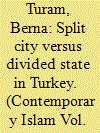

|
|
|
|
|
| Summary/Abstract |
The main goal of this article is to scrutinize and analyze two new formations of political opposition to the increasingly authoritarian pro-Islamic Justice and Development Party (Adalet ve Kalkınma Partisi, AKP) government; from within urban space and from within the branches of the state. This article investigates the context, varying agendas and future implications of these two relatively new formations of opposition, both of which have been severely attacked by the increasingly authoritarian AKP.
|
|
|
|
|
|
|
|
|
|
|
|
|
|
|
|
| 5 |
ID:
086136
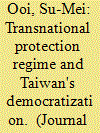

|
|
|
|
|
| Publication |
2009.
|
| Summary/Abstract |
On September 28, 1986, the Democratic Progressive Party was formed in defiance of restrictions set by a decades-old authoritarian regime, heralding the emergence of a fully competitive multiparty electoral system in Taiwan. Existing literature on Taiwan's democratic breakthrough suggests that international factors have played a significant role in bringing about democracy on the island. But what exactly were these external factors and how have they effected political change in Taiwan? A reexamination of the changing geopolitical and normative environments surrounding Taiwan suggests that they were crucial in shaping political development on the island in ways that have not been described in the literature. This article examines how the geopolitical and international normative environment enabled myriad external substate and nonstate actors to form a transnational "protection regime" around the political opposition, preserving the democratic movement and allowing it to reach its full mobilizational potential in time.
|
|
|
|
|
|
|
|
|
|
|
|
|
|
|
|
| 6 |
ID:
137789
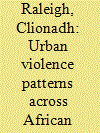

|
|
|
|
|
| Summary/Abstract |
This analysis of urban political violence across Africa considers why the proportion and frequency of conflict is increasing in urban areas while decreasing in rural areas. The decline of formally organized violence in predominantly rural areas, and the increase of more variegated forms of political opposition and conflict in urban zones, is interrogated through demographic and grievance-based explanations. Urban violence displays a range of agents, goals, intensities, and triggers and is alternatively regarded as a response to the lack of capacity and poor governance found in urban contexts, or to the changing demographic and political character of African states. Yet, the multiple, low-intensity forms of urban violence present—including militia attacks, communal contests, riots, and protests—indicate a change in the collective action capabilities and goals of modern conflict agents. These goals are themselves shaped by the experience of mounting urban grievances, but the ethnic and regional heterogeneity in urban areas prevents substantial collective action to counter the urban marginalization practiced by many African governments. Despite the low-intensity nature of urban threats, this compounded violence is a substantial security threat across developing states and is leading to the rise of the “fragile city.”
|
|
|
|
|
|
|
|
|
|
|
|
|
|
|
|
|
|
|
|
|